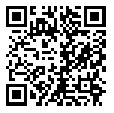Connect With Us
Red River Unitarian Universalist Church
515 North Burnett Avenue,
Denison, TX 75020
Mail: PO Box 1806
Denison, Tx 75021
Our Social Media
 Our App:
Our App:
RedRiverUU is available free from Google Play and the Apps Store (or scan this QR code).
Visit our Facebook page at: Red River UU on Facebook
Visit our YouTube Channel to see past Morning Assemblies at: Red River UU on YouTube
